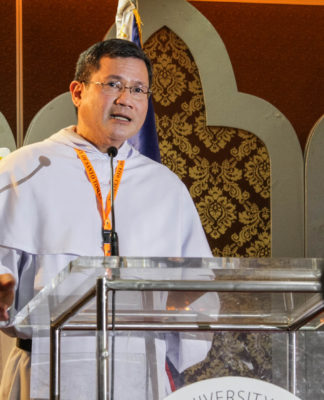WHEN St. Thomas Aquinas was sent to study under Albertus Magnus, regarded as one the most learned men of his time, his fellow novices called him Dumb Ox because he was stocky and reserved. But the great German philosopher said, “This ox will one day fill the world with his bellowing.”
True enough, Aquinas grew into one of the most influential theologians and philosophers in the world with about 80 works ascribed to him. He is without doubt the most influential Catholic philosopher.
His works included the Summa Contra Gentiles or “On the Truth of the Catholic Faith, (1261-1264),” which is a closely reasoned treatise intended to persuade intellectual Muslims of the truth of Christianity. And the Summa Theologica, (1265-73) or the “Summary Treatise of Theology,” which in three parts discusses treatise on God, the moral life of man, and Christ.
Life
An Italian native, St. Thomas was born in 1225 at the Castle of Roccasecca, near Aquino, Italy. He became an oblate of the Benedictine monastery of Monte Cassino at the age of six and began studying the liberal arts at the University of Naples in 1239.
Five years later, he entered the Order of Preachers and became a Dominican. After studying in Paris, he studied under Albert the Great (Albertus Magnus) in Cologne. He returned to Paris for further theological studies where he earned the license to teach from the University of Paris in 1256. In 1259 he returned to his native Italy to teach. Before returning to Paris, Aquinas taught for nine years at Anagni, Orvieto, Rome, and Viterbo.
At the age of 47, Aquinas was ordered to start a house of studies in Naples. After being summoned to the Council of Lyons by Pope Gregory X, Aquinas died at the Cistercian monastery of Fossanova on his way to Lyons. In 1323, Aquinas was canonized by Pope John XXII. In 1567, Pope Pius pronounced him the “Angelic Doctor.” More than six centuries later, then Pope Leo XIII named Aquinas as the “Patron of Catholic Schools”
Philosophy
Aquinas opened the minds of people to new thoughts and precepts during his time. Before, western thought had been dictated by the philosophy of St. Augustine, the Church’s great father and doctor of the fourth and fifth centuries. St. Augustine taught that to search for truth, people must depend on mystical experience.
Early in the 13th century, Latin-translated works of Aristotle abounded, accompanied by the commentaries of Averroës and other Islamic scholars. The vigor, clarity, and authority of Aristotle’s teachings restored confidence in empirical knowledge giving rise to a school of philosophers known as Averroists
According to the Averroists, ignoring Aristotle was impossible and to condemn his teachings was ineffectual because he had to be reckoned with. But St. Thomas succeeded in dealing with Averroism, a task where Albertus Magnus and other scholars failed. He reconciled the Augustinian emphasis upon the human spiritual principle with the Averroist claim of autonomy for knowledge derived from the senses. He insisted that the truths of faith and those of sense experience, as presented by Aristotle, are fully compatible and complementary.
St. Thomas believed there are ways to the knowledge of God, either by way of the philosopher or the way of the theologian. According to him, the theologian begins with revelation while the philosopher begins with ordinary experience.
The Summa Theologica used philosophical arguments to demonstrate God’s existence. However, philosophy cannot give us the knowledge of God we need for salvation, knowledge can only come through revelation, Thomas said.
God as First Cause
Although left unfinished, the Summa Theologica impressively presents St. Thomas’ views on God and morality.
According to him, God is “first cause, himself uncaused “ (primum movens immobile) and as such existent only in act (actu), that is pure actuality without potentiality and without corporeality. Thus, God’s essence is actus purus et perfectus or pure and perfect acts.
St. Thomas further defined God’s spiritual being as thinking and willing. His knowledge is and willing. His knowledge is absolutely perfect since He knows Himself and all His creations. Since every knowing being strives after the thing known as end, will is implied in knowing. God knows Himself as the perfect good, He wills Himself as end. But in that God wills everything, everything is brought by the divine will to Himself in the relation of means to end.
Following this discussion, God wills good to every being which He loves and therefore, love is the fundamental relation of God to the world. In other words, God who is the first cause has created good things such as man, because from Him comes all the goodness in the universe. And in the end, His creations return to Him, since he is the ultimate end. It is from this concept that we are presented with the concept of God as the alpha and the omega, the first and the last.
St. Thomas teaches us that man is essentially good because he originates from God and that he was originally intended to return to God when he ends his mortal existence. However, man deviated from this predestined course when Adam committed the first sin, which was passed on to succeeding generations. This concept is underscored in the second part of the Summa Theologica where St. Thomas says that man attempts to return to his original state and strives to achieve the ultimate end, which is God. Because of this, man desires perfection, which is way as to how he can be reunited with his Creator. This goal is achieved through the acts and deeds man continuously performs.
That moral habit
St. Thomas developed a system of ethics rooted on Aristotle. He saw morality as a habit emanating from the repetition of good acts done easily and heartily. As long as these acts promote the purpose of God, they are said to be meritorious. In a chain of acts of will, man strives for the highest end, who is God.
They are deemed free acts with man having knowledge of their end and principle of action. In willing the end, so also the appropriate means being chosen freely, thus completing the consensus. The end of an act will determine whether it is good or evil. It becomes evil through deviation from the reason and the divine moral law.
According to St. Thomas, sin involves two factors: its substance or matter is lust; in form, however, it is deviation from the divine law. Sin has its origin in the will, which decides, against the reason, for a changeable good.
God is not the cause of sin. On the contrary, he draws all things to himself. But from another side, God is the cause of all things, so he is efficacious also in sin.
In the Summa, St. Thomas also stated that the devil is not the direct cause of sin. He said that the devil, however, incites by working on man’s imagination and sensuous impulse. It can be inferred from this concept that the devil exercises no power over man with regard to the sins he commits. The devil can merely tempt man, who was given by God complete power over his thoughts and actions.
Searching for knowledge is searching for God
Following St. Thomas’ arguments of God as the ultimate source of all things, it can be induced that all knowledge also comes from Him.
Being given both free will and intellect, man is allowed to learn. The more knowledgeable he becomes the closer he comes to his ultimate end, which is actually returning to== God.
In the modern world, access to information and technology is at man’s fingertips, thereby enabling him with faster and better methods of accumulating knowledge, faster and better methods of bringing him closer to his Creator. However, just like any act that man commits, the end must always be in consonance with the Divine Will.
Being a dedicated educator himself, St. Thomas would have urged people to learn as much as they could about the universe that God has created because it is also through the creations where one learns about the Creator.
He said, “The act of understanding is his very being in God alone. All of God’s acts and attributes, and his being, are identically himself, since God is absolutely simple, without composition of any sort. But the human intellect is a power in some way distinct from the soul and from each of the soul’s other powers and from the human individual.
The mind is active, and its power and activity depend causally upon a higher intelligence, God; but what it is active upon, the things from which it abstracts the forms it knows, are bodies.”
St. Thomas on global changes
St. Thomas believes in change. He successfully changed people’s thoughts and perceptions on how they look at life and religious doctrines. Even during his life, he kept his mind open for new thoughts and he continuously infused changes in his writings.
With movement towards globalization, man is merely trying to consolidate the knowledge and technology it has amassed through the centuries in order to cope with the problems of global growth. This is an expression of man’s continuous attempt to perfect himself, through the way he works and the way he lives.
Not all change that occurs in the world is good though. These unexpected events happen when man attempts to deviate from the course that God has laid out for him. They happen when man exercises his will contrary to that of God’s.
St. Thomas Aquinas, the great Christian philosopher, has taught us that there are two sources of knowledge: revelation and reason. He said that the latter is a divine source of knowledge. He also taught that the truth must be believed, even when it cannot be fully understood.
Truly, Aquinas through his writings has himself followed the course that his Creator has placed before him by laying some of the foundations that has become the cornerstones of our faith today.















